TODAY’S READING FROM THE OLD TESTAMENT- 1 KINGS 7:1-51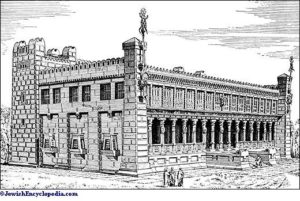
Solomon’s palace took six years longer to build than it did to build the structure of the temple. We do not know why. Because the building of the temple was the national priority, it demanded the most attention. The energies and time of the workers need to be focused on getting it built. We know that the building of the temple was completed in seven years, but it is likely that more time was required to do the inside and outside ‘finish work’ as well as complete the furnishings.
Solomon’s palace was a combination of royal residence, city hall, armory and national reception center. The palace was twice as large as the temple and consisted of two or three floors. It was 150 feet long. (The temple was 90 feet long.) The palace was 75 feet wide. (The temple was 30 feet wide). The palace stood 45 feet high, the same height as the temple.
In addition to a grand reception hall of pillars, there was a throne room, the hall of judgment, and a residence for his Egyptian wife (possibly including space for Solomon’s harem).
Like the temple the palace was constructed of costly stone and cedar from Lebanon. Because of the abundance of cedar, the palace was called “The Palace of the Forest of Lebanon”.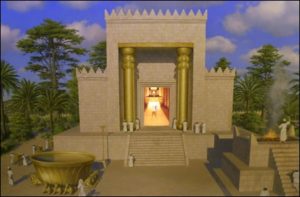
We learn that Hiram from Tyre not only supplied material from afar but came to work on the project lending his craftsmanship skill to the task of fashioning the bronze pieces.
The pillars on the porch of the house of the Lord were named, Jachin, meaning ‘he shall establish’ and Boaz ‘in him is strength’ (1 Kings 7:21).
An enormous molten sea, a tank able to contain 12,000 gallons of water, sat upon a base of 12 oxen made of brass, three of them facing in each of the four directions. The brazen sea was used for the priests’ ceremonial washing and was placed in the temple court near the altar for the burnt offerings. The Gibeonites, or Nethanim, were appointed ‘water carriers’ (Joshua 9:21) and were responsible to keep the molten sea fully supplied with water.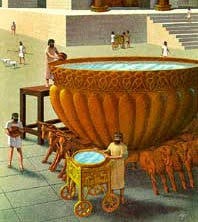
There is quite a long list of Hiram’s accomplishments in the overall construction effort (1 Kings 7:13-47). Notice the attention to detail and how the symbol of fruitfulness, the pomegranate and the symbol of righteousness, the lily, are featured in abundance.
When the temple building is complete, that which David had dedicated for use in the temple were brought to be stored in the treasuries of the house of the Lord (7:51).
TODAY’S READING FROM THE NEW TESTAMENT – ACTS 7:30-50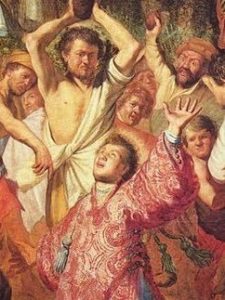
Today we read the end of Stephen’s message to the Sanhedrin in which he makes it clear that Jesus is the Promised and Expected Deliverer of Israel, the Messiah, the Righteous One.
Stephen boldly sets the record straight and turns the tables on their arguments. He reminds them that rather than upholding the Law, they and their ancestors were law breakers, given to idolatry. They worshiped idols in Egypt (Ezek 20:7-8), the golden calf in the wilderness, adopted the gods of the Canaanites in the Promised land, and were only delivered of idolatry during their captivity in Babylon.
As Abraham looked forward to a Promise that did not come in his lifetime, so Moses told of a prophet like unto himself to whom they must obey or perish (Deut 18:15-19; Acts 7:37). Stephen is reminding them that just as their ancestors had a history of rejecting God’s message and messengers and turning to idols, they were now doing the same by rejecting Jesus, the one to whom Abraham and Moses pointed.
When God said that He does not dwell in buildings made by hands, He was alluding to the fact that He would visit and tabernacle among us in flesh and blood (John 1:14).
The convicting climax of Stephen’s message is found in verse 51-53.
Acts 7:51-53 51 “You men who are stiff-necked and uncircumcised in heart and ears are always resisting the Holy Spirit; you are doing just as your fathers did. 52 “Which one of the prophets did your fathers not persecute? They killed those who had previously announced the coming of the Righteous One, whose betrayers and murderers you have now become; 53 you who received the law as ordained by angels, and yet did not keep it.”
At this, the religious leaders can take it no more. They cry out with loud voices, holding their ears, and take Stephen outside the city and stone him to death.
He becomes the first martyr recorded in the New Testament church. Open Doors reports 4,305 Christians were martyred in 2019. A researcher with the International Society for Human Rights estimated the number is about 10,000 annually.
Saul of Tarsus witnessed Stephen’s testimony, consented to his death, and guarded the garments that were laid down at his feet while they stoned this bold Christian witness. Stephen speaks out loud what he is witnessing, “Behold I see the heavens opened and the Son of Man standing at the right hand of God.” He once again is confirming the reality that Jesus is the Messiah, the Son of Man.
How wonderful it is to know that Jesus is standing up for those who give witness to His Name, and particularly for those who seal their witness in blood.
For Stephen this meant his coronation:
Revelation 2:10b 10 Be faithful until death, and I will give you the crown of life.
A heckler listening to a street preacher speaking about Stephen’s death, cried out in derision, “Why didn’t God do something for Stephen when they were stoning him?”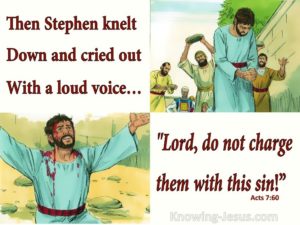
The preacher replied, “He did do something for Stephen. He gave him the grace to forgive his murderers and pray for them.”
Stephen dies with this prayer on his lips: “Lord Jesus, receive my spirit.”
And falling to his knees he cries out with a loud voice, “Lord, do not hold this sin against them.”
One of the persecutors observing Stephen, Saul of Tarsus, who would later call himself, the chief of sinners, would be haunted by these words.
TODAY’S READING FROM THE BOOK OF PSALMS- PSALM 128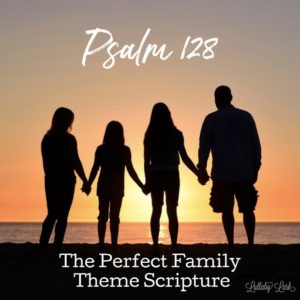
Because families would travel up to Jerusalem, it is only fitting that another one of the Psalms of Ascents be about families.
Psalm 128:1 1 How blessed is everyone who fears the LORD, Who walks in His ways.
The word for ‘blessed’ here is ‘asher’ in Hebrew, which means ‘happy’.
Verse 2 describes a satisfying and happy life where one’s hard work is rewarded.
Verses 3-4 describe the blessing of a happy God-centered family life
The final verses are a benediction pronounced from Zion, the destination, and the place of the Ultimate Sacrifice. From the perspective of the finished work of redemption we can look forward to the empowering of the Spirit to prosper in God’s commission and see our grandchildren, real and spiritual.
Peace be upon the nation of Israel. Shalom be on all God’s people who are ruled by Him.
TODAY’S READING FROM THE BOOK OF PROVERBS – PROVERBS 16:31-33
Proverbs 16:31-33 31 A gray head is a crown of glory; It is found in the way of righteousness. 32 He who is slow to anger is better than the mighty, and he who rules his spirit, than he who captures a city. 33 The lot is cast into the lap, but its every decision is from the LORD.
These proverbs speak of the dignity of old age, the wisdom of self-control in the Spirit, and the need to trust God’s sovereignty with all that is thrown in our lap.
PRAY FOR THE NATIONS- GUINEA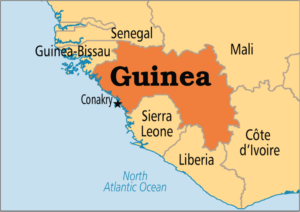
Guinea
Republic of Guinea
Africa
Geography
Area: 245,857 sq. km
245,857 sq. km on Africa’s west coast, between Guinea-Bissau and Sierra Leone.
Population: 10,323,755 Annual Growth: 2.29%
Capital: Conakry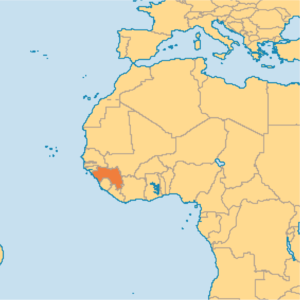
Urbanites: 35.4%
HDI Rank: 170 of 182 (UN Human Development Reports 2009)
Peoples
Peoples: 47 (62% unreached) All peoples
Unreached Peoples Prayer Card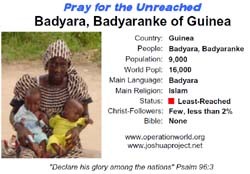
Official language: French. Major vernacular languages Fulbe, Malinke, Susu, Kissi, Guerze and Toma Languages: 38 All languages
Religion
Largest Religion: Muslim
|
Religion |
|
Pop % |
Ann Gr |
|
461,472 |
4.47 |
3.4 |
|
|
74,526 |
0.7 |
1.5 |
|
|
Muslim |
9,118,973 |
88.33 |
|
Answer to Prayer
The vision for missions deepens. Guinea’s foreign mission groups show an incredible level of unity, strategic coordination and quality of research. There is also an indigenous mission movement, which is still quite small and young but showing many encouraging signs. Mission training courses are held for Guinean believers, and mission mobilization congresses are planned for pastors and Christian students. A few Guineans already serve cross-culturally.
Challenge for Prayer
The Church suffered serious numerical setbacks in the late 1990s and early 2000s. Some established denominations shrank significantly, and evangelism and church planting slowed – probably largely due to nominal Christians falling away. Pray for believers who will persevere, and pray against the enemy who seeks to destroy these young or weak Christians before they can grow.
On the edge of West Africa, Guinea’s flat coastal plains melt into mountains. Neighboring six other nations, Guinea not only shares geographical boarders but conflicts as well. Instability in Sierra Leone and Liberia brought nearly one half million refugees to Guinea’s boarders in 2000, but the plight of neighboring nations is only a small portion of the trials Guinea has faced.
The product of French colonization, Guinea has faced many challenges since gaining independence in 1958. For nearly three decades, Marxist rule plundered Guinea of its economic resources. Poverty and increasing anger culminated in multiple coups, which led Guinea further from freedom than before with the suspension of the constitution and basic human rights. Finally in 2010, after protests and the demise of an oppressive regime, Guineans conducted their first free and fair election. The political history has proven fatal for the nation’s economic state, and today Guinea is one of the poorest countries in West Africa. Though it exports a high amount of bauxite annually, the majority of inhabitants live on less than a dollar per day.
Spiritually poor as well as fiscally, Evangelical Christians compose less than 1% of Guineans, trailing far behind the 88% who follow Islam. And sadly, that 1% is diminishing. Church attendance has been in the decline since the late 1990’s as many nominal Christians have fallen away. The lukewarmness of many has also hindered church planting as well as evangelism. There is great need for Guinean leaders who are well equipped and passionate for the advancement of the Gospel. The Guinean church is similarly in need of such passion, so that leaders and laymen alike might engage in evangelistic and missional efforts, reaching millions with the Gospel.
PRAYER: O Lord we read today of a completed temple, a finished work. We read in the New Testament about a brother in Christ who bore confident testimony to the fact that Jesus is the Promise, the Expected Prophet, the Messiah, the Word made flesh manifesting Your glory, and the Righteous One who is the Forgiver of our sins. We are grateful for Jesus, the One who is our advocate at Your right hand, Who intercedes for us and who stands up for us as needed. Truly we are being blessed from Zion. Grant us continued success as we each do our part to fulfill the Great Commission. May we be fruitful in every good work, especially in the work of making disciples. Birth spiritual children and grandchildren through our prayerful investments in the next generation. In Jesus’ Name. Amen.
